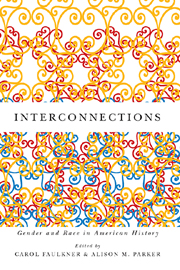Book contents
- Frontmatter
- Contents
- Introduction
- Part 1 Bridging History, Theory, and Practice
- Part 2 Frontiers of Citizenship
- Part 3 Civil Rights and the Law
- Part 4 Sexuality, Class, and Morality
- 7 A “Corrupting Influence”: Idleness and Sexuality during the Great Depression
- 8 What Women Want: The Paradoxes of Postmodernity as Seen through Promise Keeper and Million Man March Women
- Epilogue: Gender and Race as Cultural Barriers to Black Women in Politics
- Selected Bibliography
- List of Contributors
- Index
7 - A “Corrupting Influence”: Idleness and Sexuality during the Great Depression
from Part 4 - Sexuality, Class, and Morality
Published online by Cambridge University Press: 05 December 2015
- Frontmatter
- Contents
- Introduction
- Part 1 Bridging History, Theory, and Practice
- Part 2 Frontiers of Citizenship
- Part 3 Civil Rights and the Law
- Part 4 Sexuality, Class, and Morality
- 7 A “Corrupting Influence”: Idleness and Sexuality during the Great Depression
- 8 What Women Want: The Paradoxes of Postmodernity as Seen through Promise Keeper and Million Man March Women
- Epilogue: Gender and Race as Cultural Barriers to Black Women in Politics
- Selected Bibliography
- List of Contributors
- Index
Summary
Anna Pauline Murray found herself fighting to remain in college, pay for a room at the Harlem YWCA, and eat on a regular basis during a time when the economy of the United States was itself under considerable strain. A young woman of African descent, Murray had moved to New York City from Durham, North Carolina, in the fall of 1926 due to her determination not to attend a segregated institution in the South. Murray lived with a cousin in Brooklyn during the 1926–27 academic year, mainly so that she could supplement her education to meet Hunter College's entrance requirements and establish residency in New York, which would allow her to attend Hunter—“the poor girl's Radcliffe”—without paying tuition. Economic necessity forced the resourceful, determined Murray to go back to North Carolina for a year to work. Murray nonetheless returned to New York in the fall of 1928 for what would be “the only carefree year” that she would have as a university student. Carefree times would soon end for other members of Murray's generation. Both financial security and a life relatively free from responsibility had already been elusive for many children, adolescents, and young adults during the 1920s, especially those whose families tried to make a living off of the land. If the mid- to late 1920s witnessed a widening income gap between the working poor and wealthy, the 1930s would bring trying times to a stunning range of people living in the United States.
- Type
- Chapter
- Information
- InterconnectionsGender and Race in American History, pp. 187 - 228Publisher: Boydell & BrewerPrint publication year: 2012



